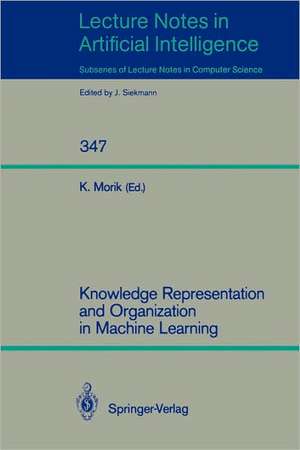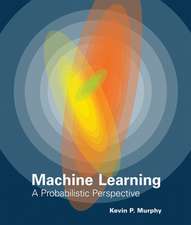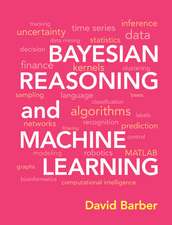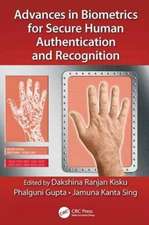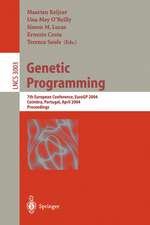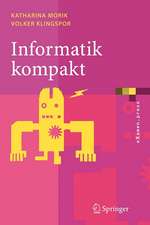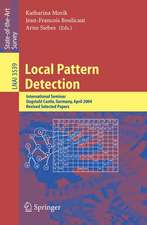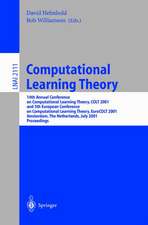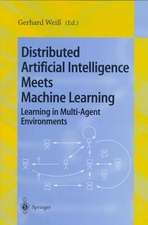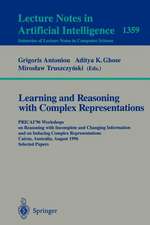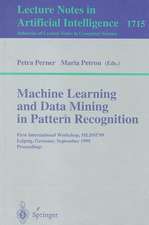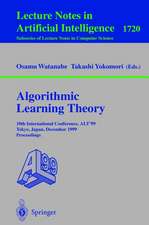Knowledge Representation and Organization in Machine Learning: Lecture Notes in Computer Science, cartea 347
Editat de Katharina Moriken Limba Engleză Paperback – 25 ian 1989
Din seria Lecture Notes in Computer Science
- 20%
 Preț: 1061.55 lei
Preț: 1061.55 lei - 20%
 Preț: 307.71 lei
Preț: 307.71 lei - 20%
 Preț: 438.69 lei
Preț: 438.69 lei - 20%
 Preț: 579.30 lei
Preț: 579.30 lei -
 Preț: 410.88 lei
Preț: 410.88 lei - 17%
 Preț: 427.22 lei
Preț: 427.22 lei - 20%
 Preț: 596.46 lei
Preț: 596.46 lei - 15%
 Preț: 448.04 lei
Preț: 448.04 lei - 20%
 Preț: 353.50 lei
Preț: 353.50 lei -
 Preț: 389.49 lei
Preț: 389.49 lei - 20%
 Preț: 309.90 lei
Preț: 309.90 lei - 20%
 Preț: 645.28 lei
Preț: 645.28 lei - 20%
 Preț: 763.23 lei
Preț: 763.23 lei - 15%
 Preț: 580.46 lei
Preț: 580.46 lei - 20%
 Preț: 310.28 lei
Preț: 310.28 lei - 20%
 Preț: 655.02 lei
Preț: 655.02 lei - 20%
 Preț: 1183.14 lei
Preț: 1183.14 lei - 20%
 Preț: 340.32 lei
Preț: 340.32 lei -
 Preț: 449.57 lei
Preț: 449.57 lei - 20%
 Preț: 591.51 lei
Preț: 591.51 lei - 18%
 Preț: 938.83 lei
Preț: 938.83 lei - 20%
 Preț: 337.00 lei
Preț: 337.00 lei - 20%
 Preț: 649.50 lei
Preț: 649.50 lei - 20%
 Preț: 607.40 lei
Preț: 607.40 lei - 20%
 Preț: 1414.79 lei
Preț: 1414.79 lei - 20%
 Preț: 1024.44 lei
Preț: 1024.44 lei - 20%
 Preț: 583.40 lei
Preț: 583.40 lei - 20%
 Preț: 453.32 lei
Preț: 453.32 lei - 20%
 Preț: 575.49 lei
Preț: 575.49 lei - 20%
 Preț: 1075.26 lei
Preț: 1075.26 lei - 20%
 Preț: 585.88 lei
Preț: 585.88 lei - 20%
 Preț: 825.93 lei
Preț: 825.93 lei - 17%
 Preț: 360.20 lei
Preț: 360.20 lei - 20%
 Preț: 763.23 lei
Preț: 763.23 lei - 20%
 Preț: 340.32 lei
Preț: 340.32 lei - 20%
 Preț: 504.58 lei
Preț: 504.58 lei - 20%
 Preț: 369.13 lei
Preț: 369.13 lei - 20%
 Preț: 580.93 lei
Preț: 580.93 lei - 20%
 Preț: 343.62 lei
Preț: 343.62 lei - 20%
 Preț: 350.21 lei
Preț: 350.21 lei - 20%
 Preț: 583.40 lei
Preț: 583.40 lei - 20%
 Preț: 583.40 lei
Preț: 583.40 lei - 15%
 Preț: 438.59 lei
Preț: 438.59 lei - 20%
 Preț: 341.95 lei
Preț: 341.95 lei - 20%
 Preț: 238.01 lei
Preț: 238.01 lei - 20%
 Preț: 538.30 lei
Preț: 538.30 lei
Preț: 334.53 lei
Preț vechi: 418.16 lei
-20% Nou
Puncte Express: 502
Preț estimativ în valută:
64.02€ • 69.52$ • 53.78£
64.02€ • 69.52$ • 53.78£
Carte tipărită la comandă
Livrare economică 22 aprilie-06 mai
Preluare comenzi: 021 569.72.76
Specificații
ISBN-13: 9783540507680
ISBN-10: 354050768X
Pagini: 340
Ilustrații: XVIII, 322 p.
Dimensiuni: 155 x 235 x 18 mm
Greutate: 0.48 kg
Ediția:1989
Editura: Springer Berlin, Heidelberg
Colecția Springer
Seriile Lecture Notes in Computer Science, Lecture Notes in Artificial Intelligence
Locul publicării:Berlin, Heidelberg, Germany
ISBN-10: 354050768X
Pagini: 340
Ilustrații: XVIII, 322 p.
Dimensiuni: 155 x 235 x 18 mm
Greutate: 0.48 kg
Ediția:1989
Editura: Springer Berlin, Heidelberg
Colecția Springer
Seriile Lecture Notes in Computer Science, Lecture Notes in Artificial Intelligence
Locul publicării:Berlin, Heidelberg, Germany
Public țintă
ResearchCuprins
Explanation: A source of guidance for knowledge representation.- (Re)presentation issues in second generation expert systems.- Some aspects of learning and reorganization in an analogical representation.- A knowledge-intensive learning system for document retrieval.- Constructing expert systems as building mental models or toward a cognitive ontology for expert systems.- Sloppy modeling.- The central role of explanations in disciple.- An inference engine for representing multiple theories.- The acquisition of model-knowledge for a model-driven machine learning approach.- Using attribute dependencies for rule learning.- Learning disjunctive concepts.- The use of analogy in incremental SBL.- Knowledge base refinement using apprenticeship learning techniques.- Creating high level knowledge structures from simple elements.- Demand-driven concept formation.
